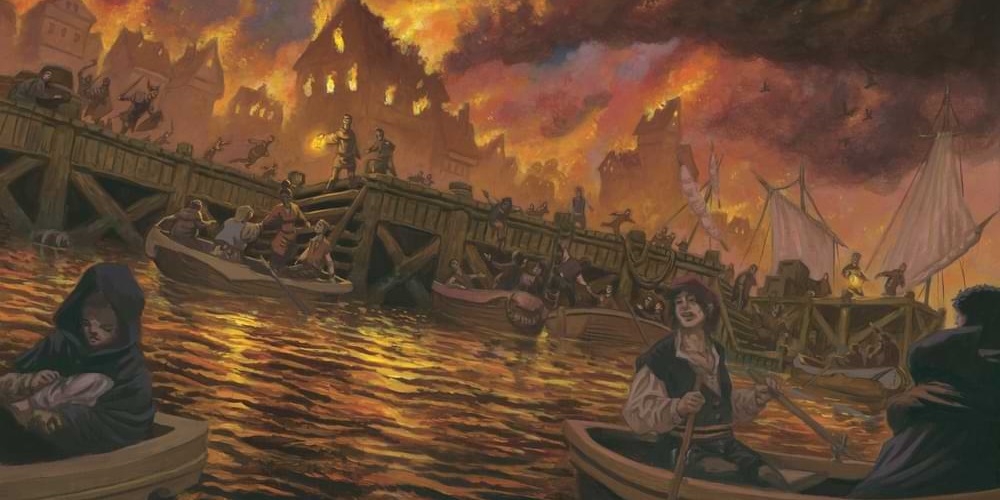Fair enough. I'm pointing out that the PHB contemplates it. So does Gygax's DMG, with its list of government types.
I think we can safely discount Gygax's take on morality.
Also, while the books may say "here's how feudalism works," how often is it actually used properly in a game? Maybe
your game use a feudalism system, but how many games in total do you think use it?
What you describe here is the trope of romantic fantasy. It only works if you actually ignore everything about how the "beleaguered peasants" are living and subsisting. What do the knights do to accrue the wealth that makes their steeds, castles, armour etc possible? What percentage of the population can possibly be supported in that style?
Which, IME, describes the vast majority of D&D games. How are the knights accruing wealth? Killing dragons, most likely. How is the population supported? Well, since most settings have gods dedicated to nature or agriculture, their clerics would have the
duty to
use their magic to make sure the crops grow healthy and strong.
Perhaps you are happy to ignore those things. To the best of my knowledge, no-one calls you a murderer or tyrant or fascist for doing so, although in the real world ignoring those things would be deeply, deeply reactionary and vicious.
I should hope that nobody calls me a fascist for making a world where people aren't being abused!
And reactionary and vicious to who? This isn't the real world and it doesn't have real history. The moment you include magic or sentient non-humans or active gods you take it away from anything approaching realism. Gold dragons, or elves, or human monks (the class) developed Enlightenment ideas ages ago.
It is
unrealistic to make a fantasy world, include fantasy elements, and assume that it works exactly the same way that the real world worked.
DL is working in the same space, using the same device of suspending a certain sort of moral judgement.
Actually they weren't considered normal or good in any universal sense. Frederick Douglass, for instance, wrote and spoke well before 1884 (I think that was the year you mentioned). The revolution in Haiti had well and truly taken place by that time. I don't need the authors of Deadlands to tell me how to make political sense of American society in 1884.
I wasn't aware that Haiti was in the American South.
And have you not heard of "scientific racism?" Of the leaps people made to come up with reasons while non-whites and women should be kept in their place because they couldn't handle things the way white men could, that they needed white men to show them the way? There are literally people
today who say that slavery was good because it helped to "civilize" Africans. Yes, racism and sexism was very much considered
good in many places.
This is also ignoring the actual point, which is: just because something was acceptable
then doesn't mean it's acceptable
today.
DL is not a treatise on politics. It's not even a treatise on theology. It's a work of religiously informed romantic fantasy, and it uses the trope of divine retribution because that is part of the palette of tropes used within that genre to convey thoughts about the humility and pride, and the relationship between humans, hope, providence and redemption.
And divine justice, in a fantasy world that uses alignments, is evil--at least when it involves genocide and world-damaging events. Nobody was taught humility or pride; they were killed. The survivors weren't filled with hope or redemption; they were abandoned for centuries, even the ones who had always been faithful. The kingpriest and his most evil followers weren't targeted with pinpoint-accurate strikes.
It's even not "divine justice." It's a meaningless backstory and plot contrivance used to make the players feel heroic when they reverse it in the
very first adventure. It
might be divine justice if the meta-plot advanced in a way that, after several years of the game and things being progressively worse, Dragonlance decided that the gods were leaving and here comes the next boxed set or edition, sans divine spellcasters. If it had been done as a series of adventures like the Grand Conjunction of Ravenloft.
Instead? It's nothing. It's literally pointless. It has no meaning to the game or setting being played, unless the meaning is "the gods of this world are jerks and shouldn't be worshiped" or you're choosing to play a game during that time period.
This claim is literally false. It is as literally false as would be my claim The only reason for you to play a game with paladins and peasant is because you are an uber-reactionary who hates everything achieved by the French Revolution and similar social and political movements.
Why would I care about the French Revolution in a setting that has no France?
Part of why I have said that your criticism is shallow is that it is seems so self-centred: you extend to yourself the privilege of imagination and artistic expression by way of fantasy tropes, but think that anyone else who is doing the same, but using tropes you are not interested in, must be taking their tropes literally and not understanding how to engage in imaginative expression.
Which is rather what you're doing as well, you know, by saying that people who aren't accepting that this "divine justice" is perfectly OK are wrong.


 www.dndbeyond.com
www.dndbeyond.com


